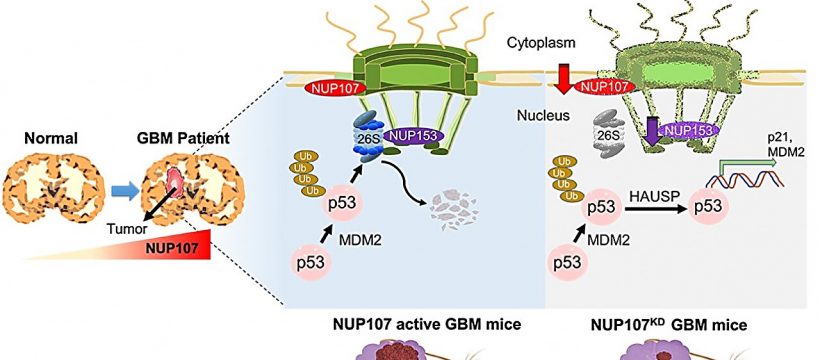
Several types of cancer are believed to be linked to alterations of macromolecular structures known as nuclear pore complexes (NPCs). These structures are embedded in the nuclear envelope, a membrane barrier that separates the nucleus of a cell from the cytoplasm (the liquid filling the rest of the cell). They consist of proteins called nucleoporins, which regulate the transport of molecules across the nuclear envelope, including enzymes that enable the synthesis of DNA. Whether NPC alterations play a role in glioblastoma, the most common type of cancer originating in the brain, is unclear at the moment.
Now, Masaharu Hazawa, Mitsutoshi Nakada and Richard Wong and from Kanazawa University and colleagues have found a link between the functioning of NPCs and glioblastoma—specifically, they demonstrated the inactivation of a tumor-suppressing protein called p53. Their research is published in Cell Reports.
The protein p53 is crucial in cancer prevention. The corresponding gene TP53 encodes proteins that prevent mutations of the genome and is the most frequently mutated gene in human cancers. Gaining insights into how p53 inactivation happens is crucial for understanding tumorigenesis in general and glioblastoma in particular.
Nakada and Wong and colleagues first checked whether any nuclear pore complex proteins were amplified (“overexpressed”) in glioblastoma. They found that one such protein, called NUP107, showed overexpression. Further investigations revealed that NUP107 is a potential oncoprotein in glioblastoma; its overexpression degrades the function of the cancer-suppressing p53 protein. They also found that MDM2, another protein, is overexpressed simultaneously with NUP107. MDM2 is also known to mediate p53 protein degradation.
Further studies will be necessary to uncover the full molecular pathways at play, but the scientists speculate that the increased amount of NUP107 proteins in the NPCs of glioblastoma cells results in NPC structures that regulate the transport of molecules from the nucleus to the cytoplasm in a way that promotes p53 degradation. This scenario is referred to as nuclear transport surveillance. Experiments in which NUP107 proteins were depleted re-activated p53, consistent with NUP107 providing structural stability of glioblastoma NPCs.
The findings of Nakada and Wong and colleagues confirm that alterations of NPCs contribute to the pathogenesis of glioblastoma. The researchers state, “Together, our findings establish roles of NPCs in transport surveillance and provide insights into p53 inactivation in glioblastoma.”
More information:
Dini Kurnia Ikliptikawati et al, Nuclear transport surveillance of p53 by nuclear pores in glioblastoma, Cell Reports (2023). DOI: 10.1016/j.celrep.2023.112882
Journal information:
Cell Reports
Source: Read Full Article
